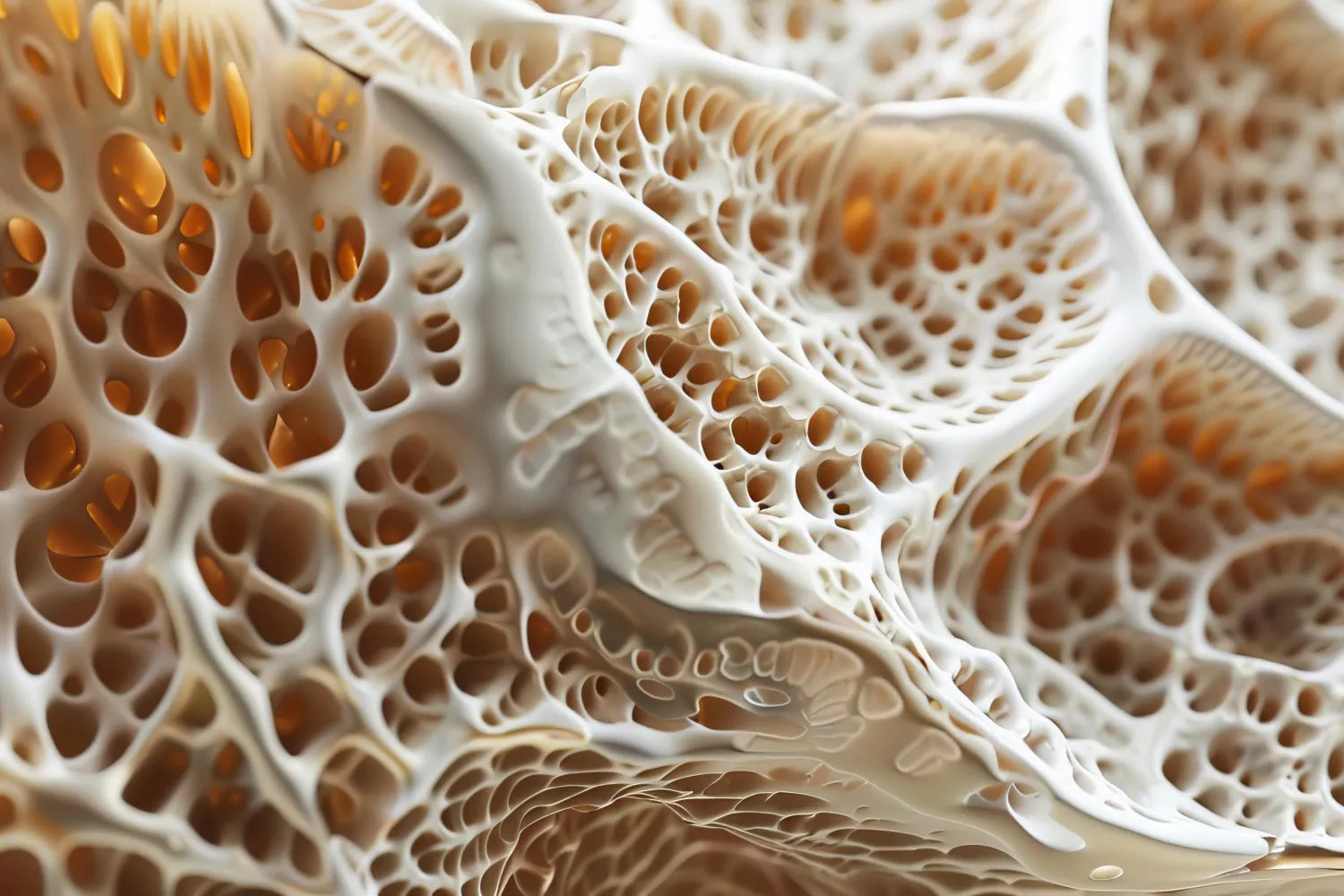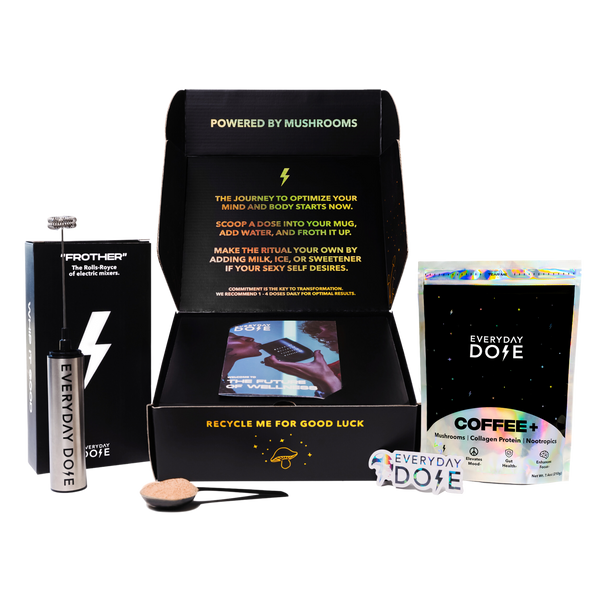Mycelium vs. Fruiting Body: What Makes for a Better Extract?

So, you’ve decided to enter the marvelous world of mushroom extracts. Maybe you’re here because you’ve heard of the brain-supporting benefits of lion’s mane, or maybe you’re looking for the gut-loving goodness of chaga.
Whatever brought you here, there are a few key decisions you’ll need to make before you choose a supplement. For instance, should you use an extract made with mushroom mycelium or one made with fruiting bodies? Learn the answers to this question and more below.
What Is Mycelium?
First things first, it helps to define exactly what mycelium is. It’s more than just a funny word you may or may not have learned in middle school science class — it’s one of the main parts of a mushroom.
Think of mycelium as a mushroom’s roots. Mushrooms are fungi, which means they don’t have the same roots as plants do. However, mycelium basically has the same purpose. It brings nutrients to the mushroom and it usually remains unseen.
Unlike roots, mycelium has a very fine texture, looking wispy or feathery. It’s also much more dense than roots are. For insurance, if you’ve ever seen mold grow on a piece of food, you’ve seen mycelium. The thin mycelia is what gives mold its fuzzy appearance, and it’s what most people think of when they think of mold.
The mycelium helps break down whatever it’s trying to eat, decomposing it and extracting the nutrients. This process can even ferment foods, and it can help make certain foods or organisms easier for many other plants and animals to eat.
Technically, mycelium is the main part of the mushroom. Mycelium can exist without a fruiting body, but fruiting bodies cannot exist without mycelia.
What Is a Fruiting Body?
The other main part of a mushroom is a fruiting body. If mycelia are like roots, then fruiting bodies are like flowers.
The fruiting body of a mushroom exists for one purpose: reproduction. When the mushroom matures, it grows a fruiting body that contains spores. These spores are then released, where they float in the wind until they land and create more mushrooms.
Fruiting bodies also have another important benefit: They help us identify the type of mushroom we’re dealing with. Many mushrooms are hard or downright impossible to identify based on their mycelia alone.
However, mushrooms are pretty easy to pinpoint once you see their fruiting bodies. If you’ve ever seen a mushroom growing out of the ground, you’ve seen a fruiting body.
Which One Is Better for Extracts?
Now that we have a better understanding of mushroom anatomy, we can move on to the real question at hand: Which one is better for extracts and supplements?
Mycelium is far easier to grow since it takes certain growing conditions to make a fruiting body. You can also get much more mycelium with lower effort, as fruiting bodies are such small parts of the mushrooms themselves.
That said, fruiting bodies are much more concentrated than mycelium is. Fruiting bodies are made from compact mycelium, which gives them their powdery texture. Fruiting bodies and mycelium have the same basic nutrients, but since fruiting bodies are made of highly condensed mycelium, they’re much higher in nutritional content.
Also, fruiting bodies have slightly different compounds than mycelia. The medicinal compounds we use to experience health benefits are higher in fruiting bodies, and fruiting bodies also contain more beta-glucans. Beta-glucans are prebiotic fibers that can support gut health and provide other health benefits.
It’s also worth noting that mycelium is pretty much impossible to separate from whatever it’s grown on. Since most companies that use mycelium-based products do it to cut costs, they probably also feed their mycelia grain instead of wood. That means whatever product is made with this mycelium will also contain grain, which acts as a filler and lowers the potency of the final product.
At Everyday Dose, we don’t take the easy way out. We use 100 percent fruiting bodies in our mushroom blends because they’re that much better, even if they’re harder and less efficient to grow.
How Can You Tell Which Part Was Used?
Supplements are not regulated by the Food and Drug Administration (FDA). This doesn’t mean they’re bad or untrustworthy, but it does mean that they aren’t standardized.
When drugs are regulated by the FDA, you are guaranteed that your medication actually contains what’s listed on the package — nothing more, nothing less. Since the government puts its seal of approval on these medications, it has an interest in making sure they are consistent and effective.
Because supplements don’t have this same level of regulation, they aren’t required to prove that their ingredients match the labels. You might use a supplement that says it uses mushroom extracts, but it’s not required to say which part of the mushroom it used.
Ultimately, this means your decision comes down to one thing: how much you trust the supplement company. Trustworthy companies will be honest and straightforward about the ingredients they use.
What makes a company trustworthy, you ask? Generally, you can look for brands that demonstrate they truly care about the quality of their supplements, use only the best ingredients, and are passionate about what they do.
That said, one thing you can look for is a label that says a product is made with “100% fruiting bodies.” If you see anything that says “mycelium,” “mycelial biomass,” or “full spectrum mushrooms,” run like the wind! At best, that means the product contains a considerable amount of mycelium. At worst, you might have a fully mycelium-based product on your hands.
What Else Should You Look For in a Mushroom Supplement?
Medicinal mushrooms might have been used for hundreds of years, but the mushroom supplements we know of today have only recently become popular. Because the market is so new, you might be wondering what exactly you should look for when choosing a mushroom supplement. Here are a few key factors to consider.
Extract vs. Powder
One of the first things you’ll notice when looking for a mushroom supplement is that mushrooms are either extracted or powdered. This might not seem like a huge deal — either way, you’re still ingesting the mushroom, right? Unfortunately, it’s not as simple as it sounds.
Mushroom powders are made by grinding down mushrooms into fine powder. Meanwhile, mushroom extracts are made by soaking mushrooms in hot water and/or alcohol, which is known as a double extraction.
Mushrooms have many great health-supporting compounds, but unfortunately, these compounds are held within a material called chitin. This is the same material that makes up the hard exoskeletons we see in insects.
More importantly, chitin is totally indigestible — which means all of those good compounds (polysaccharides) are stuck inside. It’s like trying to get a treasure locked inside a chest.
Hot water breaks down the chitin, which then releases the bioactive compounds within. This can help you experience the full range of benefits that medicinal mushrooms can provide.
At Everyday Dose, we put all of our mushrooms through a double extraction process. By using both hot water and alcohol in our process, we’re able to extract both polysaccharides and triterpenes from the mushrooms, opening the door for even more benefits.
Grain-Fed vs. Wood-Fed
Have you ever heard the saying, “You are what you eat”? Well, the same is true for mushrooms.
In nature, mushrooms usually grow on trees and other decaying matter. However, commercial companies trying to grow mushrooms as efficiently as possible often feed their mushrooms grains. These might include barley, wheat, and even oats.
Unfortunately, the limited nutrition available in these grains leads to an overall weaker product. The fruiting bodies and mycelia of mushrooms grown using grains can be lower in beneficial compounds and in overall nutritional value. It’s similar to eating grain-fed vs. grass-fed meat.
That’s why many brands, ourselves included, grow mushrooms using wood or sawdust, which is much closer to what mushrooms naturally consume in the wild. Grain-fed mushrooms also may not develop a fruiting body. This means that if your supplement uses grain-fed mushrooms, you’re likely getting mycelium — not fruiting bodies.
Types of Mushrooms Used
Lastly, consider the types of mushrooms that are in your supplement. There are tons of mushrooms that have medicinal properties, and all of them can have slightly different benefits. To make sure your supplement is the best choice for you, make sure you research the types of mushrooms that are included and their benefits.
Here are some of the most common types of functional mushrooms:
- Lion’s Mane: This fuzzy white mushroom can support mental clarity, encourage a balanced mood, support gut health thanks to prebiotic fiber, and encourage the body’s natural detoxing abilities.
- Chaga: Chaga also contains prebiotic fibers and can also support immunity. It is incredibly rich in antioxidants and can support long-term health.
- Reishi: Reishi mushroom can support a healthy inflammatory response and encourage the gut microbiome.
- Cordyceps: Cordyceps has been long used in Traditional Chinese Medicine to encourage endurance, energy, immunity, and heart health.
- Shiitake: This mushroom can encourage healthy blood sugar levels, support the immune system, and neutralize bacteria.
- Oyster: Oyster mushrooms can encourage overall heart health, healthy cholesterol levels, and a healthy immune response.
- Turkey Tail: Turkey tail is high in antioxidants and can also support immunity.
The Bottom Line
Mycelium is the most important part of the mushroom, but it also tends to have lower concentrations of bioactive compounds than fruiting bodies. However, many supplement companies use mycelium instead of fruiting bodies to keep costs and production times down.
We’re proud to say that we put quality over cost. Our Mushroom Coffee+ blend features 100 percent, wood-grown fruiting bodies from both lion’s mane and chaga mushrooms. It also features collagen protein, L-theanine to support sleep, and coffee extract to provide that earthy taste we all know and love. To learn more about our ingredients, visit our blog today!
Sources:
Mycelium: Exploring the hidden dimension of fungi | Kew
Start your day
The Right Way








